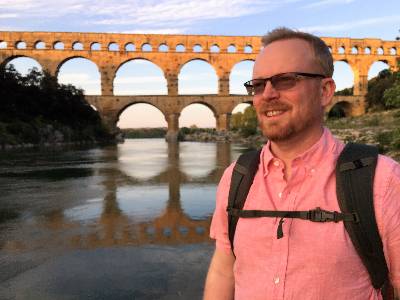Jay Zarnetske elected to lead important water science organization
Jay Zarnetske, associate professor in Michigan State University’s Department of Earth and Environmental Sciences in the College of Natural Science, has been elected chair of the board of directors for the Consortium of Universities for the Advancement of Hydrologic Science, Inc. CUAHSI).

Jay Zarnetske in front of the Pont de Gard, a Roman aqueduct bridge in France, where he spent a year researching how ecosystems are affected by a lack of water. Much of Europe has sustained record droughts this year and last. Like this ancient aqueduct connects water across vast distances, CUAHSI provides the infrastructure to connect people and ideas across vast distances. Credit: Phoebe Zarnetske
An internationally recognized expert in the areas of freshwater resource issues and catchment hydrology, Zarnetske was elected to the executive leadership for the 2023-2025 term, serving as board chair in 2023. The appointment recognizes Zarnetske’s outstanding contributions to the field of hydrology and his commitment to advancing the United States and international water science communities.
CUAHSI is a nonprofit organization that facilitates the interdisciplinary advancement of water science globally. With more than 160 member institutions, CUAHSI is dedicated to empowering the water community and advancing science through collaboration, infrastructure and education.
Zarnetske first became aware of CUAHSI as a graduate student nearly 20 years ago, when he benefited from access to CUAHSI’s computational resources for his research. He was later active intermittently in CUAHSI activities before being elected to the board of directors in 2020, where he has led multiple initiatives over the years. As chair, he will oversee governance of the organization, including the approximately $20M operations budget.
Zarnetske acknowledges that this will likely be one of the most transformative periods for the 23-year-old organization.
“During my term as chair, we will be onboarding the newly hired CUAHSI executive director and developing and implementing a new 2023-2028 strategic plan,” Zarnetske said. “We also will be co-leading the generation of the 2024-2029 National Science Foundation Cooperative Agreement Proposal that funds much of the CUAHSI’s operations.”
Zarnetske added that perhaps even more important will be the recruiting of new, historically excluded member institutions under the recently approved, more equitable and inclusive bylaws and diversity, equity, inclusion and justice (DEIJ) strategic plan that he helped develop with the board.
“It is a lot, but it is all very high-impact work that supports research, teaching and DEIJ progress across countless scholarly institutions, which aligns with MSU’s mission of advancing scholarship, outreach, equity and economic activities,” he said. “Being a part of these community-serving initiatives is very exciting. CUAHSI is a critical catalyst for United States and international water science communities seeking to develop a holistic understanding of water, ecosystems and society to meet the complex needs of humans and the environment.”
“We are pleased that Dr. Zarnetske has been elected to this important national leadership position,” said Douglas Buhler, associate vice president for Research and Innovation at MSU. “This is well-aligned with our strategic goals for scientific leadership and furthers our focus on implementing interdisciplinary approaches to complex problems.”
Prior to joining MSU, Zarnetske was a Gaylord Donnelly Environmental Postdoctoral Fellow at the Yale Institute for Biospheric Studies and The Forest School, Yale School of the Environment. He received a Ph.D. in water resource science from Oregon State University, an M.S. in watershed science from Utah State University's College of Natural Resources, and a B.A. in geology from Colby College. He also served as a visiting scientist for New Zealand's National Institute for Water and Atmospheric Research and a consulting groundwater hydrologist for CDM-Smith, Inc.Banner image: This stream in the Brooks Range of Arctic Alaska is one of many sites where Jay Zarnetske works to help understand water resources. Data and discoveries from this stream, like countless other studies around the world, are archived and made accessible to all via open-access resources supported by CUAHSI. Credit: Jay Zarnetske